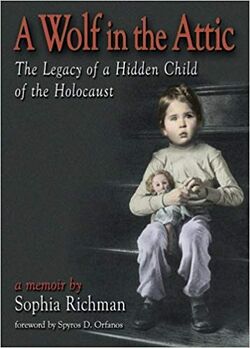Sophia Richman (F / Poland, 1941), Holocaust survivor
Sophia Richman (F / Poland, 1941), Holocaust survivor.
- KEYWORDS : <Hidden Children> -- <France> <United States>
- MEMOIRS : A Wolf in the Attic (2002)
Biography
NOTES : Richman was born in 1941 in Poland, of middle-class Jewish parents. Five months after her birth, Germany invaded the Soviet Union. Richman's father was sent to the Janowska labor camp in Lwow, but her mother was able to obtain the birth, baptismal, and marriage certificate of a deceased Catholic parishioner, and the two of them went into hiding in the home of non-Jews. In 1943 her father escaped from the camp and joined his wife and daughter in hiding. "Terror was in the atmosphere I breathed," she remembers. In 1951, after spending time in Paris, they came to the U.S., and Richman chronicles her "struggles and triumphs of adolescence" in New York, her college years, and her work as a psychoanalyst. Her memoir is the story of what happens when a hidden child of the Holocaust grows up, the after-effects of trauma, and the difficulties of a young woman fighting to forge an identity in a world that wants to forget. Most of all, it's the story of one woman's survival.
Book: A Wolf in the Attic (2002)
- A Wolf in the Attic: The Legacy of a Hidden Child of the Holocaust (New York: Haworth Press, 2002).
"A Wolf in the Attic: Even though she was only two, the little girl knew she must never go into the attic. Strange noises came from there. Mama said there was a wolf upstairs, a hungry, dangerous wolf . . . but the truth was far more dangerous than that. Much too dangerous to tell a Jewish child marked for death ... A Wolf in the Attic is a powerful memoir written by a psychoanalyst who was a hidden child in Poland during World War II. Her story, in addition to its immediate impact, illustrates her struggle to come to terms with the powerful yet sometimes subtle impact of childhood trauma ... In the author's words: “As a very young child I experienced the Holocaust in a way that made it almost impossible to integrate and make sense of the experience. For me, there was no life before the war, no secure early childhood to hold in mind, no context in which to place what was happening to me and around me. The Holocaust was in the air that I breathed daily for the first four years of my life. I took it in deeply without awareness or critical judgment. I ingested it with the milk I drank from my mother’s breast. It had the taste of fear and despair.” ... Born during the Holocaust in what was once a part of Poland, Sophia Richman spent her early years in hiding in a small village near Lwów, the city where she was born. Hidden in plain sight, both she and her mother passed as Christian Poles. Later, her father, who escaped from a concentration camp, found them and hid in their attic until the liberation ... The story of the miraculous survival of this Jewish family is only the beginning of their long journey out of the Holocaust. The war years are followed by migration and displacement as the refugees search for a new homeland. They move from Ukraine to Poland to France and eventually settle in America. A Wolf in the Attic traces the effects of the author’s experiences on her role as an American teen, a wife, a mother, and eventually, a psychoanalyst ... Repeatedly told by her parents that she was too young to remember the war years, Sophia spent much of her life trying to ”remember to forget” what she did indeed remember. A Wolf in the Attic follows her life as she gradually becomes able to reclaim her past, to understand its impact on her life and the choices she has made, and finally, to heal a part of herself that she had been so long taught to deny."--Publisher description.
